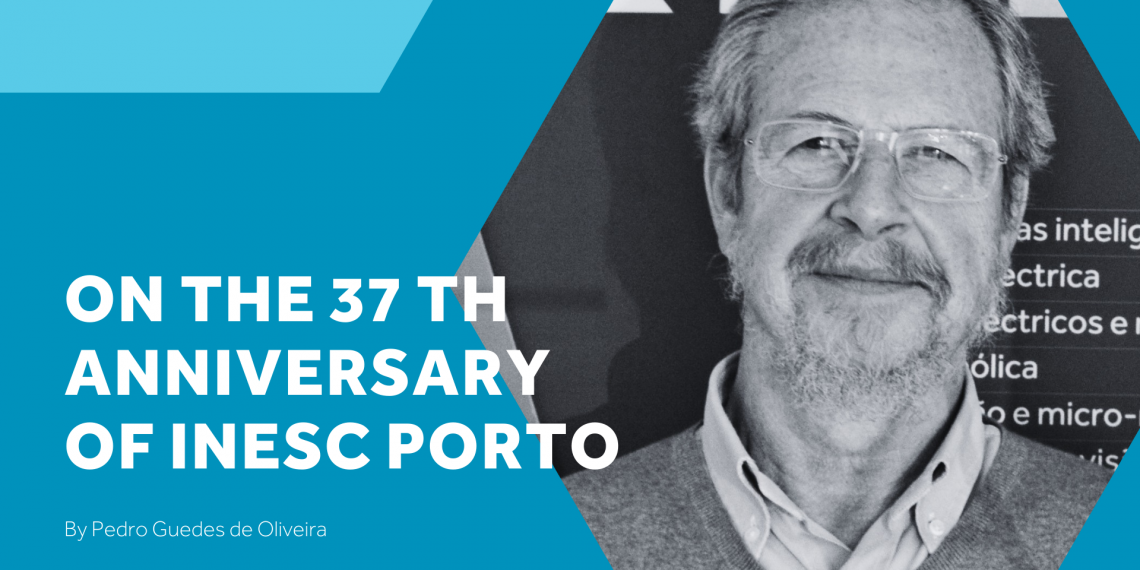The number 37 is not a particularly round one, so the 37th anniversary of INESC Porto will not assume a “special” celebration. This doesn’t mean we shouldn’t recall and, looking back, try to understand how, amid all the enormous changes of the last almost 40 years, we have survived and how, in my opinion, we have preserved the same values and the same essential matrix.
In 1985, we weren’t yet INESC TEC or INESC Porto; we were only the first INESC site outside Lisbon, the informally called INESC Norte. The foundations had their origin at the Faculty of Sciences, where José António Salcedo and Manuel Barros had already an established collaboration with Lisbon, involving then the Faculty of Engineering in a long and not always easy process — but of which I (who at the time, was in Aveiro) was not a direct witness. The U.Porto became part of the academic block (which comprehended UTL and IST) and, to comply with the original rules of INESC – 50% academic and 50% business -, CPRM joined CTT and TLP as a business associate. The board of the Porto site included Salcedo, Borges Gouveia and Pimenta Alves, none of them being 40 years old yet. In fact, I believe that they have lived longer during the existence of INESC Porto, than before that.
This is not the place to tell the long and not always linear or easy story of what we have been [1], but I would like to emphasise three aspects that I think are particularly relevant in defining of what we are [2].
- The notion of public service: for all those who promoted and managed the institute, INESC TEC was above all a means of public intervention. For some, as part of their mission as university professors, and for many others the place of professional involvement through research, and innovation, aiming at developing the country.
- The integration of research, innovation, and service provision in the same workspace and with the same teams. It is a difficult combination, with thin borders, which sometimes leaves less room than would be desirable for freer research and, at other times, brings us closer to what companies themselves, with market rules, do or can do. It is impossible to say that these borders have never been crossed and that the relationship with the business world has always been peaceful. But, at the time of creation and for many years, the level of technical development of our companies was often rudimentary, “forcing” us to carry out actions that didn’t always translate into the most advanced academic research. Although not everyone realises it, the business world, in Portugal, has changed in an unbelievable way; and this has also forced us to hold back our own intervention, avoiding being perceived as unfair competitors, which, among other things, led us to promote a tech-based business fabric. AITEC, based in Lisbon and with a delegation in Porto, was, at the time, a very disruptive initiative.
- The equal dignity of the work of all employees, whether in research, technical support, or services. Equal dignity and relevance, acknowledging that the quality and motivation of each one of them is crucial to achieve collective success.
Perhaps this commitment to basic issues is the secret of our longevity and success. The current impact of INESC TEC in the national scientific and technological system is indisputable, but it should not mislead and deflect us from two fundamental issues:
- our international standing still lacks a similar impact;
- and, last but not the least, that early sense of the relevance of youth was lost. I hear too often people saying that this or that person is too young or not mature enough. The national academic community is ageing rapidly, and the price to pay will be harsh. At INESC TEC we can (and must) return to being the ones who, also in this regard, were able to push through.
[1] If anyone is interested in this story, the book “80-15-35, 35 years of INESC” provides a very thorough view of INESC Porto and of the whole (and all) INESC(s).
[2] In order to discuss this, I should have completed the declaration of conflict of interest, since I was, to a certain extent, a direct participant in the process; BIP readers are hereby advised.
Pedro Guedes de Oliveira, Consultant to the Chairman




 News, current topics, curiosities and so much more about INESC TEC and its community!
News, current topics, curiosities and so much more about INESC TEC and its community!